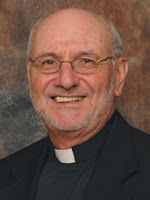Once a month I like to publish Fr. John Rausch's article as a guest blogger. Fr. John is Glenmary priest living in Eastern, KY. His monthly columns are published in newspapers around the country but I believe this blog continues to be one of the only place you can read his reflection on the internet.
A recent spate of high profile murders has people scrambling for reasons. The massacre of 12 movie goers in Aurora, Colorado, the murder of 6 worshipers at the Sikh temple in Wisconsin and the shootings outside the Empire State Building in New York raise the level of anxiety in all parts of society.
People demand reasonable explanations for why these acts of violence occur. The usual reasons focus on the individual: the perpetrator was mentally ill, he was a member of a hate group, or he was an aggrieved, fired employee. We seem satisfied for the moment when we have identified a troubled individual whose errant behavior we can explain. Life then becomes more rational and less chaotic. We live with less fear, but still a certain level of anxiety lingers.
A haunting question remains: what if the violent acts of seemingly isolated individuals are, on some level, linked? What if social patterns, customs, or conventions exist that more easily facilitate people for committing murder and violent crimes with guns because they are angry, demented or vengeful?
One of those overlooked linking factors might include our neglected mental health system coupled with an uncritical acceptance of guns in our society.
Although the U.S. murder rate has declined 44 percent since 1995, and rates of other violent crimes have also decreased, America’s gun lobby and gun industry have benefitted from a perceived fear that our families are in danger, or the government plans to confiscate our guns. A climate of fear has spurred a series of laws to deregulate gun control that includes easier concealed weapon laws and Stand Your Ground legislation that allowed a neighborhood watch volunteer in Florida to justify shooting a stranger. In 2007 a study by the National District Attorneys Association found “there was a change in perceptions of public safety after the terrorist attacks of 9/11.” Basically, many citizens doubted that government agencies could protect them and their families in the event of subsequent terror attacks.
The number of firearms manufactured in the U.S. grew by 63 percent between 2007 and 2011. Experts now estimate there are 90 guns for every 100 Americans, which amounts to about 250 million guns.
The US experiences almost 20 mass murders a year and annually there are 30,000 gun deaths and 70,000 injuries. Part of the problem rests with angry or mentally disturbed people getting access to guns. The more guns, the easier access.
Coupled with the proliferation of guns, the disregard for people’s mental health becomes a lethal combination. For the past 30 years cuts in mental-health programs have substituted prisons and city streets for mental hospitals and clinics. States have slashed $1.6 billion from mental-health programs since 2009.
People of faith recognize that balanced budgets are fine, but not at the expense of people’s health and public safety. The moral principles of prudence and the common good are needed to guide our legislative priorities about guns. Just as constitutional rights of free speech, press and assembly are subject to limitations, so too should the right to bear arms. Firearms for hunting and marksmanship represent acceptable categories of guns from the semiautomatic assault weapons used in most mass murders.
Society will be safer when it helps some of the 98,000 workers making firearms to become mental-health workers and anger management counselors, and safer still, when we turn our fear of strangers to a fear of accidentally killing a loved one--something many times more likely with a gun around the house. The politics of guns is an emphasis on fear, not community.

No comments:
Post a Comment